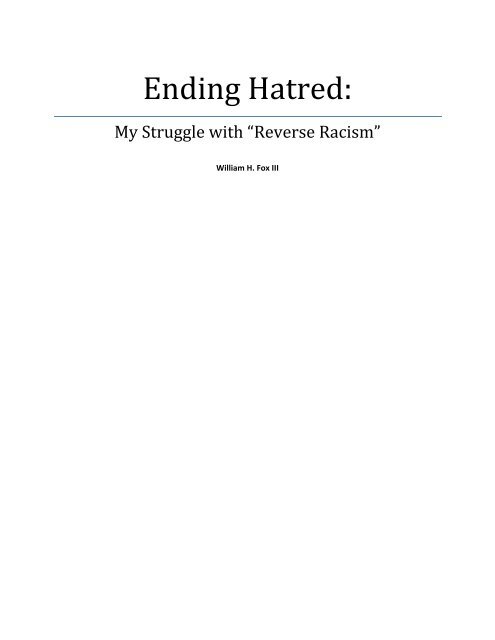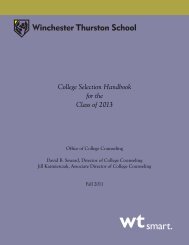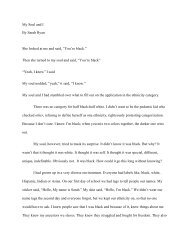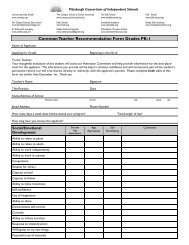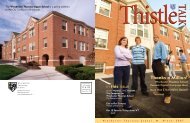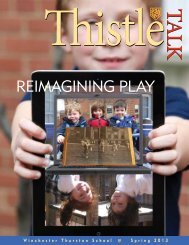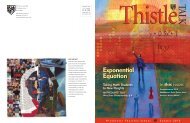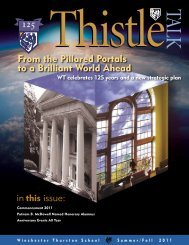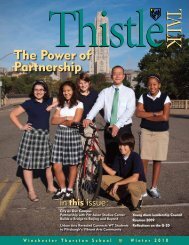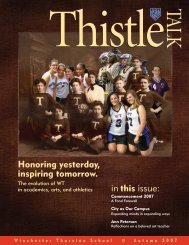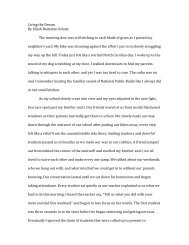Ending Hatred: My Struggle with - Winchester Thurston School
Ending Hatred: My Struggle with - Winchester Thurston School
Ending Hatred: My Struggle with - Winchester Thurston School
Create successful ePaper yourself
Turn your PDF publications into a flip-book with our unique Google optimized e-Paper software.
<strong>Ending</strong> <strong>Hatred</strong>:<br />
<strong>My</strong> <strong>Struggle</strong> <strong>with</strong> “Reverse Racism”<br />
William H. Fox III
Recently in English class, we were discussing Dr. King’s “Letter from Birmingham Jail” when<br />
another student came up <strong>with</strong> the phrase, “there can be no change until we end hatred.” This idea<br />
strikes me now as representative of the entire problem of racism in America; it is as well representative<br />
of my personal struggle <strong>with</strong> issues of discrimination, not just by race, but against any group, be it one of<br />
differing sexual orientation or differing religious affiliation. This idea simply is sensible, and puts forth a<br />
clear goal, yet we are still mired in petty issues of discrimination.<br />
<strong>My</strong> struggle is not about my own feelings; it’s about others’ feelings and my struggle <strong>with</strong> them.<br />
I struggle <strong>with</strong> the theoretically stark division between “black” and “white.” In History class, we are<br />
taught that the “whites” oppressed the “blacks.” But then, in middle school science, we learned that<br />
only a few genes separate “races.” If we are so similar, it just doesn’t make sense why we can’t get<br />
along. Yet, we are still taught <strong>with</strong> emphasis on the sharp distinctions between such similar groups.<br />
Maybe it would be better to say, “There can be no change until we end differentiation.”<br />
Being a so‐called “WASP”‐ a “White Anglo‐Saxon Protestant” and growing up in a middle‐class<br />
suburban neighborhood, one <strong>with</strong> no sidewalks or any children my age, I’ve had practically no<br />
encounters <strong>with</strong> other racial groups other than in my high school. Even there, it’s a controlled<br />
environment, where the motto is to “think also of the comforts and rights of others.” I’ve never<br />
witnessed anyone put down because of their skin tone. What Dr King struggled <strong>with</strong> every day of his life<br />
seems impossibly far away. Yet, I hear about things like the shooting of Trayvon Martin and “racial<br />
quotas” that confuse me in terms of racial identity. I don’t know if I’m supposed to feel culpable for the<br />
horrible actions of some white people, just because we share the same color skin. Aren’t “white people”<br />
to blame for the wrongs done to the blacks’ ancestors? Yet I can’t simply ignore the problem. At the<br />
same time that we are being told that we are equal, we are being told that we aren’t.<br />
Interestingly enough, the place where I’ve encountered discrimination the most is my home.<br />
Simply bringing up blacks, Muslims, or Hispanics <strong>with</strong> my parents (not to mention my die‐hard
Republican grandparents) involves wading through angry stereotypes. Back when I was entering high<br />
school was the first time I heard about “racial quotas,” in a conversation <strong>with</strong> my dad. He was stressing<br />
the importance of good grads, but what he said next shocked me: “You need to maintain great grades,”<br />
he told me, “and keep up your extracurricular activities. That’s the only way you’ll be noticed by the<br />
colleges; they’re not looking for WASPs, they need blacks for ‘diversity.’” I didn’t know how to respond<br />
to this other than to simply nod. If it was true, it was blatant discrimination on the part of the colleges.<br />
Later, my dad also told me of different, easier tests and hiring quotas for people of color. It’s hard to tell<br />
when affirmative action becomes unfairness. Even then, political correctness says that it’s wrong to<br />
criticize any agenda other than that of “whites.”<br />
Dr. King’s legacy is a difficult concept today. Everyone can agree that he was an amazing leader<br />
and speaker, but what about his ideals? How are we supposed to know when the goals Dr. King died for<br />
have been completed? Have we reached a time when “little black boys and black girls will be able to join<br />
hands <strong>with</strong> little white boys and white girls as sisters and brothers?” These are the questions that I<br />
struggle <strong>with</strong>, and it doesn’t seem like the answers are anywhere to be found. If it is true that there can<br />
be no change when the world still contains hatred, then how can we end it? In Martin Luther King’s<br />
time, there was a clear goal for oppressed blacks of America: desegregation, and subsequently equality<br />
socially and economically. Today, there is still a difference between groups, but it is more a case of<br />
shades of gray (or a rainbow) than simply black and white. And today, we have no Dr. King to lead<br />
everyone, whatever their colors, into the “palace of justice.”


